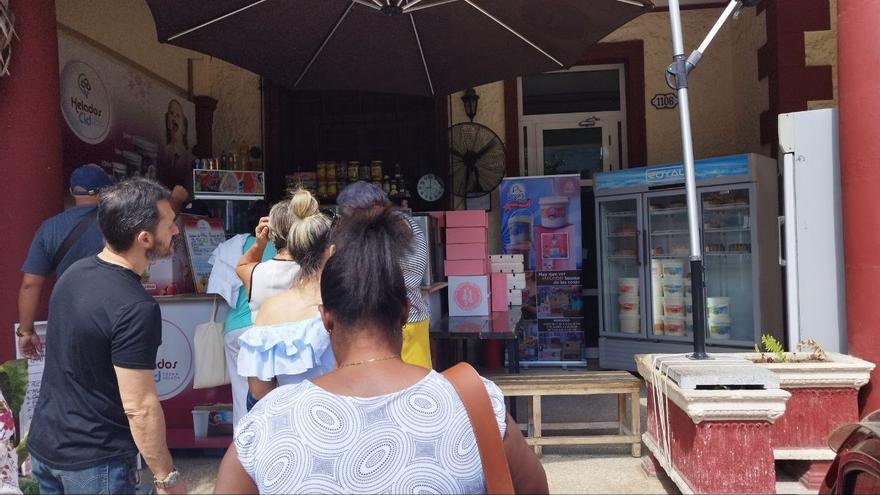
![]() EFE/14ymedio, Havana, January 23, 2024 — The owners of the MSMEs (micro, small and medium sized enterprises, mipymes in Spanish) are trying to disassociate themselves from their links to the Cuban Government, which the exile community, the opposition and the Cuban population attribute to them. In a press conference on Monday at the headquarters of a food production and import company in Havana, some of these new entrepreneurs asked the U.S. for the same ability to engage in business that the private sectors of other countries have, which are also sanctioned by the U.S. State Department.
EFE/14ymedio, Havana, January 23, 2024 — The owners of the MSMEs (micro, small and medium sized enterprises, mipymes in Spanish) are trying to disassociate themselves from their links to the Cuban Government, which the exile community, the opposition and the Cuban population attribute to them. In a press conference on Monday at the headquarters of a food production and import company in Havana, some of these new entrepreneurs asked the U.S. for the same ability to engage in business that the private sectors of other countries have, which are also sanctioned by the U.S. State Department.
The press conference followed a speech in the U.S. Congress Western Hemisphere subcommittee hearing in which the Republican María Elvira Salazarse, born in Cuba, spoke about the Cuban private sector.
The representative from Florida said that many owners of the MSMEs, which now exceed 10,000, are actually people linked to the Government of the Island, which she defined as “the Hamas of the continent.”
Oniel Hernández, co-founder of the consulting firm Auge, asserted that Salazar’s speech was an “attempt to tie the hands of the Administration” of Democratic President Joe Biden
Oniel Hernández, co-founder of the consulting firm Auge, said that Salazar’s speech was an “attempt to tie the hands of the Administration” of Democratic President Joe Biden in his policy towards Cuba and assured that the private companies on the Island “are real.”
“It is impossible for a sector where 1.6 million people are employed to be fully linked to the Government or the leaders of the Communist Party,” he defended.
Eric Jacobstein, deputy undersecretary in the Office of Latin American Affairs of the State Department, also spoke at the hearing, saying that Washington does not plan for now to allow the MSMEs access to the U.S. banking system, which is a relief for congressmen such as Salazar, who warned that doing so would “violate the embargo.”
For Carlos Miguel Pérez, partner of a software company and a Cuban deputy, the hearing “was very regrettable.” He also warned that Congresswoman Salazar’s position coincides with the “Cuban ultra-left” that is against the private sector on the Island.
Considered by some specialists as the great energizers of the economy, others blame the MSMEs for the high inflation and say the high prices for their products have deepened the social differences in the country.
Some 19.6% of the MSMEs are engaged in manufacturing activities and 12% in the production of food and beverages. This sector employs more than 15% of the country’s workers and contributes just under 14% of GDP, according to official figures.
Among those who have maligned the emerging private sector’s ties with the Regime is Havana Consulting Group, which considers that their creation was intended to build a facade of fake economic freedoms that do not really exist on the Island. “To be approved, the MSMEs must go through several filters, from local and provincial governments to the Ministry of Economy and Planning, plus the hidden filters of counterintelligence and the Communist Party. This method of selection is fertile ground for discriminatory exclusion for ideological reasons and for corruption,” he said in one of his reports.
Pavel Vidal: “A part of officialdom that does not want reforms will be very happy today with the pessimistic vision that seems to be widespread about the MSMEs”
Emilio Morales, a researcher in charge of the report, also warned of the possibility that the U.S. Government will end up favoring these companies to stop the migratory wave. “It is understandable that the Biden Administration looks for formulas that offer incentives to Cubans, so that they remain on the Island and do not undertake the risky departure from the country to emigrate to the United States. However, it is the Cuban regime itself that prevents this empowerment with its gag laws, with its relentless repression and with its perennial ban and persecution of the generation of wealth.”
At the opposite pole, the Trotskyist organization Communists of Cuba has criticized the regime for favoring a private sector that, in its opinion, encourages capitalism. “The Cuban ruling bureaucracy that once was proud of the advance of food production and industrialization, publishing the results in the media, now, on a monthly basis, discloses the growth of the capitalist companies under the euphemism of the MSMEs.”
On the contrary, other economists, such as Pavel Vidal, ask that the blame for Cuba’s economic ills stop being put on the MSMEs. It’s the fault of the Government. “A part of officialdom that does not want reforms will be very happy today with the pessimistic vision that seems to be generalized about the mipymes,” he argues.
Translated by Regina Anavy
____________
COLLABORATE WITH OUR WORK: The 14ymedio team is committed to practicing serious journalism that reflects Cuba’s reality in all its depth. Thank you for joining us on this long journey. We invite you to continue supporting us by becoming a member of 14ymedio now. Together we can continue transforming journalism in Cuba.
